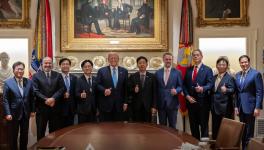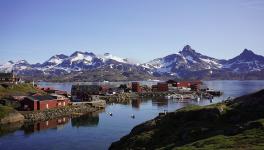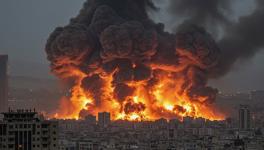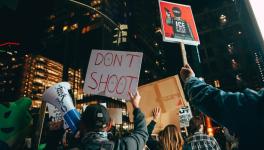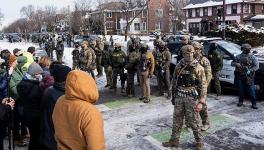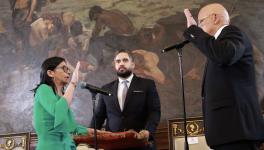Trump Chooses War Over Diplomacy in the Caribbean
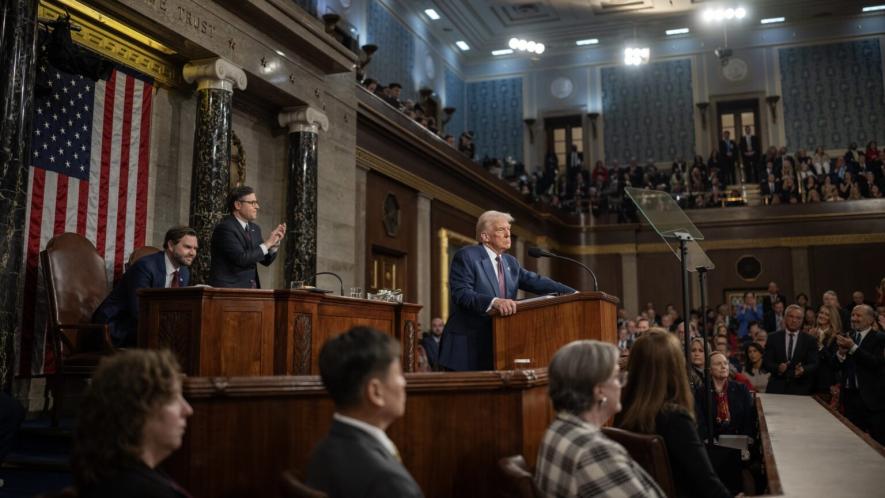
US President Donald Trump speaking at the State of the Union in March 2025. Photo: POTUS / X
Lee en español aquí
On October 6, US President Donald Trump ordered the termination of diplomacy with Venezuela. Richard Grenell, special presidential envoy, was directed by Trump to halt all diplomatic outreach and talks with Venezuelan President Nicolás Maduro.
The move follows multiple US missile strikes on boats in the Caribbean Sea. Washington claims the operations target drug traffickers, but regional leaders and legal experts say they are escalating into an undeclared war against Venezuela.
Caracas calls for diplomacy, US abandons it for war
Grenell had previously been the primary negotiator between the two governments and was involved in US-Venezuela policy decisions in general.
Back in September, President Maduro sent a letter directly to Trump, calling for diplomacy and refuting the drug-trafficking accusations the White House has levied. He pointed out how crucial Grenell’s work had been in overcoming false reports and misunderstandings that had emerged around deportation flights from the US.
“This issue was swiftly resolved and clarified during discussions with Mr. Richard Grenell. This channel has functioned flawlessly to date,” the letter stated.
Maduro cited UN data demonstrating the country’s “impeccable record in the fight against international drug trafficking”.
“This and other matters will always be open for direct and frank discussion with your special envoy Grenell, so that we can overcome media noise and fake news.”
Weeks later, Grenell’s communication with Caracas was ceased completely by President Trump.
Washington’s total diplomatic disengagement suggests that hardliners like Secretary of State Marco Rubio, who have openly called for regime change in Venezuela, are now freely leading a more aggressive, militaristic approach toward the most oil-rich nation on earth.
On Thursday, October 9, Maduro filed a complaint with the UN Security Council, requesting an emergency session over US military actions in the Caribbean.
Airstrikes at sea
The US military has now carried out airstrikes on at least four small boats in the Caribbean, raising the reported death toll of Washington’s current military aggression in the region to 21. Officials say the campaign aims to combat alleged drug trafficking but have provided no evidence for the claim.
Airstrikes began on September 2, when 11 people – later identified as fishermen – were killed in a missile strike on the first targeted ship off the coast of Venezuela.
Colombian President Gustavo Petro recently announced that the fourth bombed boat was a Colombian vessel, accusing Trump of opening a “war scenario” in the region.
“This is no war against smuggling,” Petro said. “It is a war against oil and it must be stopped by the world.”
The Trump administration has denied Petro’s allegation that the vessel was Colombian, however, an anonymous US official confirmed to the New York Times that Colombian citizens were on board.
The uncharged, untried, and largely unidentified victims of the last month of US aggression are accused of being narcotraffickers by the Trump administration.
The US has deployed at least eight warships, a nuclear-powered attack submarine, several P-8 surveillance planes, and 4,000 military personnel to the waters of the Caribbean, as well as F-35 fighter jets to Puerto Rico.
The scale and level of aggression, combined with the lack of evidence for drug trafficking accusations, has raised questions about Washington’s true intentions with Venezuela. Sources inside the Trump administration told NBC News in September, “The goal is to force Maduro to make rash decisions that could ultimately lead to his ouster – without American boots on the ground.”
US is waging an “armed conflict” against “unlawful combatants”, declares Trump
Legal experts, US lawmakers, and anti-war groups have asserted that military force in international waters is illegal, violating both international and US law, bypassing due process and law enforcement norms, and lacking any clear justification.
In an apparent attempt to provide some legal basis for the hostilities, President Trump sent a report to Congress last week declaring that the US military is engaged in a “non-international armed conflict” with drug cartels and has killed “unlawful combatants” in the Caribbean.
The president has “designated [cartels] as terrorist organizations, and determined that their actions constitute an armed attack against the United States,” Earl Matthews, the Pentagon’s general counsel told lawmakers, as reported by CNN.
The report sent to Congress is required by law (Section 1543a United States Code) whenever US military forces are engaged in hostilities, but it doesn’t automatically grant or expand the legal basis for a military campaign.
However, Secretary of War Pete Hegseth already cited the recent “legal justification” by President Trump when pressed on Sunday about the most recent airstrike at sea. “We have every authorization needed,” Hegseth told Fox News. “These [cartels] are designated as foreign terrorist organizations.”
Although some senators have questioned “the legal rationale, the mission itself, and the intel surrounding the strikes”, a war powers bill that would have limited Trump’s power, halting further airstrikes on boats without authorization from Congress, was voted down on Thursday, October 9.
The White House insists that its “armed conflict” is legal and constitutional. Yet experts and critics say Trump is waging a secret war against undefined enemies, without fully informing Congress or the people of the US – who overwhelmingly reject US intervention in Venezuela. Polls show that only 16% of Americans would support a US invasion of the country.
Threats of land strikes
Despite widespread opposition, President Trump has openly threatened a direct US attack on Venezuela. During an event on October 5 at Naval Station Norfolk in Virginia, he praised the Navy for how successful the missile strikes on alleged drug boats have been.
“We’ll have to start looking about the land because they’ll be forced to go by land,” he said.
The threat came days after NBC News reported that US military officials had in fact already drawn up plans for drone strikes within Venezuelan territory.
Venezuela belongs to Venezuelans, declares Maduro
Caracas has attempted to open dialogue with special envoy Richard Grenell, President Trump himself, and now the UN Security Council. Amid its diplomatic efforts, the country has also made massive efforts to increase its security and defense capabilities.
On October 6, Maduro announced that Venezuelan security forces had foiled a “false flag” plot by local extremists to bomb the US embassy in Caracas, in an apparent attempt to justify US military provocation. Maduro assured that his administration would reinforce security measures to protect the embassy “despite all the differences we have had with the governments of the United States.”
As soon as the US military deployment was announced by Marco Rubio in August, Venezuela mobilized its 4.5 million members of the Bolivarian National Militia. However, after enlistment campaigns calling on the Venezuelan people to defend the country’s sovereignty against US aggression, 8 million people signed up to join the militia, raising the total size of the force to over 12 million civilian combatants, according to the government. The country has conducted advanced training across the entire territory and the Caribbean Sea to consolidate its defense forces and prepare for any US attack.
“What they want is war in the Caribbean and South America. For a regime change to impose a puppet government and steal the oil, gas, and gold,” the president of the Bolivarian Republic proclaimed during the inauguration of a massive hospital in Caracas.
“But we have news for the North American empire,” he continued. “That oil, that gas, that gold, this land, and this people will continue to belong to Venezuelans. And we will never allow our homeland to be violated or touched. Never!”
Courtesy: Peoples Dispatch
Get the latest reports & analysis with people's perspective on Protests, movements & deep analytical videos, discussions of the current affairs in your Telegram app. Subscribe to NewsClick's Telegram channel & get Real-Time updates on stories, as they get published on our website.












